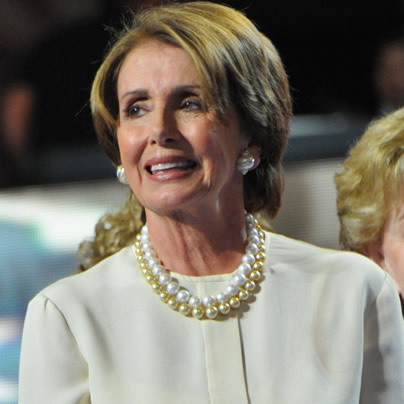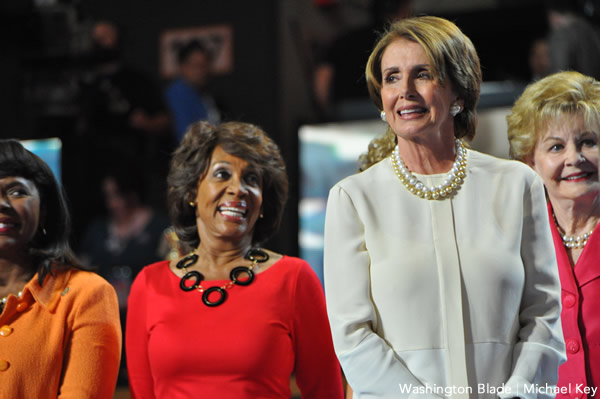News
Pelosi envisions path for House passage of ENDA
Democratic leader looks to VAWA as way to move LGBT anti-bias bill


House Minority Leader Nancy Pelosi said she hopes ENDA could pass the House in a way similar to VAWA (Washington Blade file photo by Michael Key).
During her routine news conference on Wednesday, Pelosi said she’s hoping for a situation on ENDA similar to what happened when the House passed reauthorization of the Violence Against Women Act earlier this year.
“We made it too hot to handle in the public,” Pelosi said. “It had to come to the floor. Even so, a majority of the Republicans voted against the Violence Against Women Act. But nonetheless, it came to the floor. I hope we could have a similar situation with this.”
Asked to clarify whether VAWA reauthorization could be a model for House passage of ENDA, Pelosi called for expedited movement of the legislation in her chamber.
“Well, I would think it would be “once burned, twice learned,” and that they would, shall we say, save some time by taking it right to our committee and to the floor,” Pelosi said. “It’s really important. Our country – ending discrimination is what we are all about as Americans, and we should not have discrimination in the workplace because of gender identity.”
In February, the House, amid public pressure, passed the Senate measure to reauthorize VAWA, which contained protections for LGBT victims of domestic violence. It was the first and only time a bill with LGBT-specific language passed under the leadership of House Speaker John Boehner (R-Ohio).
House Republican leadership initially brought to the floor its own version of the bill without LGBT protections, but didn’t have enough votes in its own caucus to pass the measure. Afterward, House leaders brought to the floor the Senate version of the bill, which was approved unanimously by the House Democratic caucus along with 87 Republicans.
Pelosi said Wednesday the situation could be similar for ENDA after noting the significant cultural change on LGBT issues since 2007, when a gay-only version of ENDA was introduced on the House floor. The Democratic leader attributed this change to “the community’s” efforts.
“So I would hope that the public attitude, which I attribute to the community’s activism, outside mobilization, and just family awareness and respect for people to end discrimination, increases its prospects for now,” Pelosi said. “And, it will be interesting to see if in the Republican Party they want to see a continuation of discrimination in the workplace for people because of their gender identity.”
Notably, throughout her remarks, Pelosi twice explicitly mentioned the bill’s protections in employment based on gender identity, and never once mentioned sexual orientation. That’s significant because the House under her leadership moved forward a bill in 2007 that included protections based on sexual orientation, but omitted language for transgender people.
Small progress has been made on ENDA quietly in the House amid considerable attention about whether the bill will have enough votes to pass in the Senate.
In this week alone, the legislation has gained at least two new Republican co-sponsors following the initial news that ENDA would soon come to a floor vote in the Senate. According to “Thomas,” the website for the Library of Congress, Rep. Jon Runyan (R-N.J.) signed on as a co-sponsor on Monday.
Joining him on Wednesday were six additional co-sponsors. Among them are Raul Ruiz (D-Calif.), Nydia Velazquez (D-N.Y.), G.K. Butterfield (D-N.C.), Corrine Brown (D-Fla.) and William Owens (D-N.Y.).
Rep. Chris Gibson (R-N.Y.) on Wednesday also signed on as a co-sponsor to ENDA. He’s facing a challenge next year to his congressional seat from Sean Eldridge, a gay Democratic activist who’s married to Facebook co-founder and New Republic owner Chris Hughes.
Gregory Angelo, executive director of the National Log Cabin Republicans, called Gibson’s co-sponsorship of ENDA “welcome news indeed.”
“Cynics will say that this is all politics and precipitated by Sean Eldridge’s carpetbagging candidacy, but I know that this was a decision Congressman Gibson didn’t make lightly,” Angelo said. “A great deal of contemplation and consultation with Log Cabin Republicans and others in the GOP who know support for ENDA is prevalent and growing put Congressman Gibson on the right side of history here.”
Counting these new co-sponsors and chief sponsor of ENDA gay Rep. Jared Polis (D-Colo.), the legislation has a total of 194 supporters. That’s still 24 votes shy of the 218 votes necessary to pass ENDA in the House.
Tico Almeida, president of Freedom to Work, said he agrees with Pelosi that VAWA advocates ran an impressive campaign and that method could be applied to ENDA.
“Freedom to Work and other LGBT organizations with strong Republican connections should meet with Republican House leaders to urge them to drop the Hastert Rule as they did with LGBT-inclusive VAWA and allow a vote,” Almeida said. “Our Republican Legislative Director has already started on an impressive number of Republican House meetings.”
But Almeida said a VAWA-like strategy is one of three possible approaches to passing ENDA in the House. Others, as he’s previously already articulated, include a discharge petition, as proposed by McCain-Feingold author Trevor Potter, and attaching ENDA in the Senate to a larger bill for the House to pass.
“We should try all of the above strategies in the next year before the election,” Almeida said. “It’s not a choice. We should push on multiple fronts. We can only win if we’re willing to try.”
Drew Hammill, a Pelosi spokesperson, wouldn’t rule out any option as a possibility for passing ENDA in the House despite Republican control.
“As with any measure that passes the Senate and already enjoys bipartisan support in the House, all options remain on the table,” Hammill said.
A partial transcript of the exchange between Pelosi and reporters follows:
Reporter: Madam Leader, Leader Reid in the other body mentioned in the next couple of weeks he is going to try to bring up ENDA. I know this passed in the House in 2007. I think there were 10 Republicans who are still in the House who voted for it. Why do you think there would be any chance if it moved to this body – they think they might be within striking distance of 60 next door – why would they have any ability to move it here when they can’t even pass a farm bill? Why would they be interested in trying to move ENDA in this body in this political circumstance?
Leader Pelosi: Well, I believe a lot has changed since 2007 on this subject. We have seen – as we know, in 2010, we repealed the Don’t Ask, Don’t Tell policy in the military. The Supreme Court has overturned the so-called euphemistically named Defense of Marriage Act. Thank God they overturned that and its name. And just generally, the public awareness and acceptance of ending discrimination in any way.
Some people think ENDA is ending discrimination in the workplace. Isn’t that a given in our country? Apparently not. And that’s why we have to pass the bill.
So I would hope that the public attitude, which I attribute to the community’s activism, outside mobilization, and just family awareness and respect for people to end discrimination, increases its prospects for now. And, it will be interesting to see if in the Republican Party they want to see a continuation of discrimination in the workplace for people because of their gender identity.
We had a problem with the Violence Against Women Act. They didn’t want to bring that to the floor. We made it too hot to handle in the public. It had to come to the floor. Even so, a majority of the Republicans voted against the Violence Against Women Act. But nonetheless, it came to the floor. I hope we could have a similar situation with this.
Reporter: Do you think you could use the model that was used for VAWA to make this ENDA bill “too hot to handle,” as you put it?
Pelosi: Well, I would think it would be “once burned, twice learned,” and that they would, shall we say, save some time by taking it right to our committee and to the floor. It’s really important. Our country – ending discrimination is what we are all about as Americans, and we should not have discrimination in the workplace because of gender identity.
UPDATE: This article has been updated to reflect the additional ENDA co-sponsors in the House that signed on Tuesday.
Spain
Spanish women detail abuses suffered in Franco-era institutions
Barcelona-based photographer Luca Gaetano Pira created ‘Las Descarriadas’ exhibit

A Barcelona-based photographer, audiovisual artist, and activist has created an exhibit that profiles Spanish women who suffered abuse in institutions that Gen. Francisco Franco’s dictatorship established.
Luca Gaetano Pira, who is originally from Italy, spoke with women who the regime, which governed Spain from 1936-1975, sent to Women’s Protection Board institutions.
The regime in 1941 created the board the country’s Justice Ministry oversaw.
Franco named his wife, Carmen Polo, as the board’s honorary president. Then-Prime Minister Felipe González fully dissolved the board in 1985, a decade after Franco’s death.
Gaetano’s exhibit is called “Las Descarriadas” or “The Misguided Women” in English.
“These are women who were detained between 1941 and 1985 for reasons that are unthinkable today: being lesbian, poor, pregnant out of wedlock, rebellious, politically active … or simply considered ‘morally suspect,'” Gaetano noted to the Washington Blade.
Groups affiliated with the Spanish Catholic Church ran these institutions. Gaetano pointed out they were “presented as social assistance centers.”
“In reality, they were spaces of punishment and forced reeducation, where isolation, unpaid work, and psychological violence were the norm,” he said. “Many of the survivors are still alive. Their testimonies are powerful, urgent, and of extraordinary current relevance.”
The regime sent more than 40,000 women to Women’s Protection Board institutions.
“Despite its seemingly benevolent name, it was in fact one of the most powerful instruments of moral and social control over women during and after the dictatorship,” notes the exhibit. “Under the guise of care and re-education, this institution functioned as a repressive apparatus that punished women who deviated from the ideal feminine model imposed by Franco’s regime: submissive, obedient, married, and dedicated to motherhood within the Catholic family structure.”
The Spanish Catholic Church last month issued a public apology, but Gaetano described it as “very soft” and noted “the women did not accept it.” Gaetano also compared the Women’s Protection Board institutions to Ireland’s Magdalene Laundries.
The Associated Press notes tens of thousands of “fallen” women were sent to the laundries that Catholic nuns operated in Ireland from the 18th century until the mid-1990s. Then-Irish Prime Minister Edna Kenny in 2013 issued a formal apology for the abuses that women suffered in the laundries and announced the government would compensate them.
The Spanish government has yet to offer compensation to the women abused in Women’s Protection Board institutions.
“My work focuses on recovering the historical memory of marginalized communities, particularly through the portrayal of survivors of institutional violence and the use of archival materials,” Gaetano told the Blade, noting he has also sought to highlight the repression that LGBTQ people suffered during dictatorships in Portugal and Latin America.
Gaetano’s exhibit can be found here:
District of Columbia
Gay GOP group hosts Ernst, 3 House members — all of whom oppose Equality Act
Log Cabin, congressional guest speakers mum on June 25 event

U.S. Sen. Joni Ernst (R-Iowa) and three women Republican members of the U.S. House appeared as guest speakers at the June 25 meeting of Log Cabin Republicans of D.C., the local chapter of the national LGBTQ Republican group with that same name.
The U.S. House members who joined Ernst as guest speakers at the Log Cabin meeting were Celeste Maloy (R-Utah), Kat Cammack (R-Fla.), and Julia Letlow (R-La.).
Neither D.C. Log Cabin Republicans President Andrew Minik nor spokespersons for Ernst or the three congresswomen immediately responded to a request by the Washington Blade for comment on the GOP lawmakers’ appearance at an LGBTQ GOP group’s meeting.
“Please join us for an inspiring evening as we celebrate and recognize the bold leadership and accomplishments of Republican women in Congress,” a D.C Log Cabin announcement sent to its members states.
“This month’s meeting will highlight the efforts of the Republican Women’s Caucus and explore key issues such as the Protection of Women and Girls In Sports Act and the broader fight to preserve women’s spaces in society,” the message says.
It was referring to legislation pending in Congress calling for banning transgender women from participating in women’s sports events.
According to media reports, Ernst and the three congresswomen have expressed opposition to the Equality Act, the longstanding bill pending in Congress calling for prohibiting discrimination based on sexual orientation and gender identity in the areas of employment, housing, and public accommodations.
The Log Cabin announcement says the meeting was scheduled to take place at the Royal Sands Social Club, which is a restaurant and bar at 26 N St., S.E. in the city’s Navy Yard area.
D.C. Log Cabin member Stuart West, who attended the meeting, confirmed that Ernst and the three congresswomen showed up and spoke at the event.
“It was a good turnout,” he said. “I would definitely say probably 30 or 40 people attended.” West added, “Four women came to talk to a group of mostly gay men. That’s something you don’t see very often.”
District of Columbia
D.C. police seek public’s help in July 5 murder of trans woman
Relative disputes initial decision not to list case as hate crime

D.C. police are seeking help from the public in their investigation into the murder of a transgender woman who they say was shot to death at about 12:30 a.m. on Saturday, July 5, on the 2000 block of Benning Road, N.E.
But the police announcement of the fatal shooting and a police report obtained by the Washington Blade do not identify the victim, 28-year-old Daquane ‘Dream’ Johnson of Northeast D.C., as transgender. And the police report says the shooting is not currently listed as a suspected hate crime.
It was local transgender activists and one of Johnson’s family members, her aunt, who confirmed she was transgender and said information they obtained indicates the killing could have been a hate crime.
“On Saturday, July 5, at approximately 12:51 a.m., Sixth District officers were flagged down in the 2000 block of Benning Road, Northeast, for an unconscious female,” a July 5 D.C. police statement says. “Upon arrival, officers located an adult female victim suffering from gunshot wounds,” it says.
“D.C. Fire and EMS responded to the scene and transported the victim to a local hospital where after all lifesaving efforts failed and the victim was pronounced dead,” the statement says.
A separate police flyer with a photo of Johnson announces an award of $25,000 was being offered for information leading to the arrest and conviction of the person or persons responsible for the murder.
The flyer identifies D.C. police Homicide Detective Natasha Kennedy as being the lead investigator in the case and says anyone with information about the case should contact her at 202-380-6198.
Longtime D.C. transgender rights advocate Earline Budd told the Blade that one of the police investigators contacted her about the case and that she also spoke to Detective Kennedy. Budd said police confirmed to her that Johnson was a transgender woman.

One of Johnson’s family members, Vanna Terrell, who identified herself as Johnson’s aunt, told the Blade that Johnson used the first name of Dream and had planned to legally adopt that name instead of Daquane but had not gotten around to doing so.
Terrell said she and other family members learned more about the incident when one of two teenage high school students who knew Johnson’s brother contacted a friend and told the friend that they recognized Johnson as they witnessed the shooting. Terrell said the friend then called her to tell her what the friend learned from the two witnesses.
According to Terrell, the witnesses reportedly saw three men approach Johnson as Johnson walked along Benning Road and one of them called Johnson a derogatory name, leading Terrell to believe the men recognized Johnson as a transgender woman.
Terrell said one of the witnesses told the friend, who spoke to Terrell, that the man who shot Johnson kept shooting her until all of the bullets were fired. Budd, who said she spoke to Terrell, who also told her what the witnesses reported, said she believed the multiple shots fired by the shooter was an “overkill” that appears to have been a hate crime. Terrell said she too believes the murder was a hate crime.
In response to an inquiry from the Blade, Officer Ebony Major, a D.C. police spokesperson, stated in an email, “At this point there is nothing in the investigation that indicates the offense was motivated by hate or bias.”
Terrell said a memorial gathering to honor Johnson’s life was scheduled to be held Saturday, July 12, at River Terrace Park, which is located at 500 36th St., N.E. not far from where the shooting occurred.

-

 Virginia2 days ago
Virginia2 days agoDefying trends, new LGBTQ center opens in rural Winchester, Va.
-

 South Africa5 days ago
South Africa5 days agoLesbian feminist becomes South African MP
-

 Travel4 days ago
Travel4 days agoManchester is vibrant tapestry of culture, history, and Pride
-

 Opinions3 days ago
Opinions3 days agoUSAID’s demise: America’s global betrayal of trust with LGBTQ people











